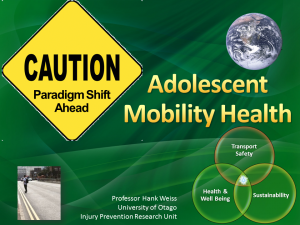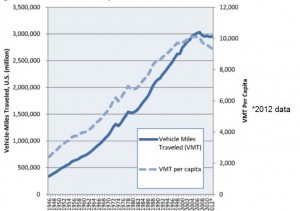News stories from the field:
2nd Annual AMHC Symposium – “Moving Forward: Decreasing car use among teenagers”
2013-06-27 04:06:05This international multidisciplinary event showcased current research and practice in teen mobility, active transport, the effects of the built environment and climate change, and youth engagement. Links to recorded video presentations and graphics can be found on the Symposium page and the AMHC YouTube Channel.
"A New Direction: Our Changing Relationship with Driving and the Implications for America's Future."
2013-06-27 03:56:46Original Article at US PIRG
The Driving Boom—a six decade-long period of steady increases in per-capita driving in the United States—is over.
Americans drive fewer total miles today than we did eight years ago, and fewer per person than we did at the end of Bill Clinton’s first term. The unique combination of conditions that fueled the Driving Boom—from cheap gas prices to the rapid expansion of the workforce during the Baby Boom generation—no longer exists. Meanwhile, a new generation—the Millennials—is demanding a new American Dream less dependent on driving.
Caution! Paradigm Shift Ahead: “Adolescent mobility health”
2012-10-11 02:11:09 This is a multimedia presentation by Professor Hank Weiss, delivered Tuesday, October 02, 2012 at the Safety 2012 World Conference (47 min).
This is a multimedia presentation by Professor Hank Weiss, delivered Tuesday, October 02, 2012 at the Safety 2012 World Conference (47 min).
Adolescents warrant special attention. From a road safety perspective, they carry the largest crash and morbidity/mortality risk of any age group. This has led to considerable research and safety programs, but these efforts have plateaued in many countries and remain fixed within a road safety perspective. From a broader perspective, little has been done about the many non-traffic health risks related to teen driving (increased drug and alcohol use, anti-social behaviour, sexually transmitted infections, inactivity and obesity). From a sustainable transport perspective, a contemporary imperative, teens are where the transition from non-driver to driver takes place; an opportune time for interventions to minimize environmental harms.
Professor Weiss introduces a new paradigm termed ‘mobility health’ to bridge the siloed domains of safety, adolescent health and sustainable mobility. In this passionate speech to an international audience, he advocates changing the current narrow paradigm of adolescent road safety to a cross-level/cross-disciplinary, more potent, timely and healthy vision of less driving through mobility modal shift from cars to active and public transport.
Gen Y Eschewing V-8 for 4G - Bloomberg
2012-09-07 23:52:47 “The rate of U.S. auto sales to 18-to-34-year-old buyers declined to 11 percent in April 2012, down from 17 percent for the same age group in April 2007, before the recession, according to Southfield, Michigan-based R.L. Polk & Co. ”
“The rate of U.S. auto sales to 18-to-34-year-old buyers declined to 11 percent in April 2012, down from 17 percent for the same age group in April 2007, before the recession, according to Southfield, Michigan-based R.L. Polk & Co. ”
Development Banks Invest Billions on Sustainable Transport
2012-07-16 01:16:38Original article at www.slocat.net
RIO DE JANEIRO, BRAZIL (20 June, 2012 )—The eight largest multilateral development banks (MDBs) announced today that they will invest US$175 billion to finance more sustainable transportation systems over the coming decade, boosting equitable economic development and protecting the environment and public health across the developing world. The pledge by the Asian Development Bank, the World Bank and six other MDBs was made at the start of United Nations Conference on Sustainable Development (also known as Rio+20).




Comments